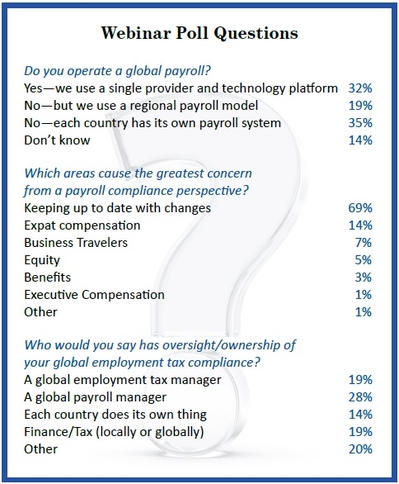 Once an organization has implemented a global payroll solution, that doesn’t mean all compliance issues are resolved. In the webinar “Should Global Payroll Operations = Global Employment Tax Compliance,” two Deloitte Tax LLP experts make the case for taking a global approach to employment tax compliance.
Once an organization has implemented a global payroll solution, that doesn’t mean all compliance issues are resolved. In the webinar “Should Global Payroll Operations = Global Employment Tax Compliance,” two Deloitte Tax LLP experts make the case for taking a global approach to employment tax compliance.
Jason Russell, Managing Director, Global Employer Services, Deloitte Tax LLP, and Eira Jones, Client Service Executive, Global Employer Services, explained that a global approach to employment tax compliance is the natural next step after an organization has adopted a global payroll operations approach.
They discussed:
- The current pace of legislative change and employment tax audit activity around the world
- Why an additional global employment tax compliance wrapper around the payroll operation is often necessary
- The principles organizations can follow to build their own approach to global employment tax
They noted that countries expect increasing transparency and are changing penalty rates for companies that do not comply.
“These regimes are really all about employers being more transparent with tax authorities regarding how they conduct tax compliance and how they ensure that they have appropriate controls and processes in place to make sure their tax filings are correct,” Jones said.
As a result, organizations are doubling down on wage tax compliance. They noted that managing employment tax compliance extends beyond payroll to include the cooperation of stakeholders such as human resources and stock administration. “We’re really seeing a significant shift in two areas: Increased frequency of reporting via electronic platform, and increased volume of data being required through electronic platforms,” Jones said.
She cited Russia, China, Brazil, and France as countries expecting more information in a timelier manner.
“There’s pressure on tax authorities to reduce income tax filing obligations for individuals because it’s expensive to administer,” she said. “I can see a reality in the future where we start to see increasing reliance on payroll information as the source of truth around an individual’s tax affairs and decreased reliance on the individual tax return.”
She recommended that organizations take a proactive approach to monitoring compliance and cooperative with the tax authorities in doing so.
“You have the opportunity to have a better, less adversarial relationship with the tax authorities,” she said. “If you voluntarily disclose issues to the tax authorities, you can benefit from a lower penalty.”
Russell noted that a country-by-country approach is not working for many organizations.
“When we are all fighting the same battles country by country, it makes sense to look at a consolidated enforcement preparation program and a review profile that consolidates forces,” he said. “We think the challenges make sense to look at on a global basis.”